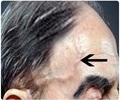It's a condition that has existed for centuries, doctors say. But only recently has it been given a name: "chronic daily headaches," or CDH, defined as migraines or neck- and head-squeezing tension headaches that are present 15 or more days each month.
Some might think it sounds like just another excuse to skip school. But young people such as Rachel Gohmann, an 18-year-old college freshman from St. Cloud, Minnesota, know how serious the condition can be.Blinding headaches that often left her bedridden caused her to miss more than 100 days of her senior year of high school -- with her worst migraine lasting nearly a month. Medication and a tutor helped her make it to graduation. But, now a freshman at St. Cloud State University, she's still missing some classes and making at least one trip a month to the emergency room, where she's given narcotic drugs that help her sleep.
"And that's a good month," Gohmann says. Doctors say that anywhere from 1 percent to 5 percent of the population, including young people, suffer from chronic daily headaches.
Roughly an equal number of boys and girls suffer from them in the elementary years. But once adolescence hits, young women are about three times as likely to have them, partly due to hormonal changes related to menstruation. Other factors, such as a family history of headaches, stress and depression, also can play a role for both genders.
"It's really sad because these headaches take all the pleasure out of life at a time when high school and college students should be enjoying their lives," says Dr. Michael Cutrer, a neurologist who specializes in primary headache disorders at the Mayo Clinic.
If left untreated, he says, the severity of the headaches often increases -- making it imperative that treatment begin in the early years.
Gohmann is one of Cutrer's many young patients. She says that when she first started getting the headaches last year, her friends didn't really understand.
"There was confusion about why I was gone so much; they thought I'd gotten in with a bad crowd," says Gohmann, an honors student who wants to be a psychologist. "They thought I was making it up."
Abigail Rey experienced much the same response from her doctor in Virginia when she first got bad headaches five years ago.
"My doctor said to just deal with it," says the 16-year-old, who now lives in Shoreline, Washington, and has since found a physician to treat her chronic migraines. She says even some parents don't believe their children's headaches are so bad.
"They just think they're complaining -- that it's not a real disorder, things like that," Aurora says. "But if it's interfering with the quality of life -- keeping them from everyday activities -- then it's probably time to seek help."
Still, even the most experienced of headache specialists say that finding relief for chronic daily headaches isn't always easy.
The director of the pediatric headache clinic at the University of Maryland Hospital for Children in Baltimore says that at least half the young patients who come to see him suffer from chronic daily headaches.
Often, it is a matter of trying various migraine medications. Among the most common are prescription drugs called "triptans," which are marketed under such names as Maxalt, Amerge, Imitrex and Zomig. They're taken at the onset of a headache.
Because chronic headaches often run in families, some doctors give their young patients drugs that have worked on relatives. Others also have found that antidepressants sometimes help, since depression can be an underlying factor. And some accompany the use of prescription drugs with acupuncture or botox injections to relax stiffened head and neck muscles.
Doctors say it's also important that their young patients stay on a regular sleep schedule and avoid stress and skipping meals.
Gohmann has tried all of it -- and says a new triptan medication seems to be helping. Still living at home because of the headaches, she's still hoping she'll be able to go away to college.











